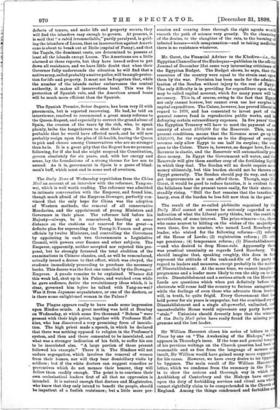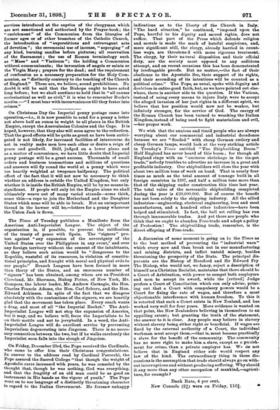Sir William Harcourt closes his series of letters to t L
Times by one on "The Awakening of the Bishops," whi' appears in Thursday's issue. If the tone and general tecIP° of his previous writings on the Church question had been reasonable and as free from the language of menace ar insult, Sir William would have gained many more support. for his cause. However, we have every desire to let bygone be bygones. The main result of Sir William Harcourt letter, which we condense from the summary in the Tim( is to show the serious and thorough way in which th Archbishop of Canterbury and the Bishops have enter upon the duty of forbidding services and ritual acts whir cannot rightfully claim to be comprehended in the Church ° England. Among the things condemned and forbidden services introduced at the caprice of the clergyman which are not sanctioned and authorised by the Prayer-book ; the " enrichment" of the Communion from the liturgies of former ages or of other branches of the Catholic Church, the introduction of "superstitious and extravagant acts of devotion " ; the ceremonial use of incense, " asperging " of any kind, burning candles before pictures; all reservation of the Sacrament ; the use of Roman terminology such as " Mass " and " Viaticum "; the holding a Communion without communicants ; the invocation of angels or saints or the Virgin Mary ; prayers for the dead ; and the requirement of confession as a necessary preparation for the Holy Com- munion, as "distinctly contrary to the teaching of the Church of England." These are, we believe, sound prohibitions. No doubt it will be said that the Bishops ought to have acted long before ; but we shall continue to hold that in "all causes ecclesiastical as well as civil," it is wise to remember Burke's maxim :—" I must bear with inconveniences till they fester into crimes."



































 Previous page
Previous page